The Traveling Con Man never announces his arrival, but you feel his impact immediately. He sweeps over everything, a totalizing and usurping force. Once he arrives in your hamlet, things are never the same. Lives are ruined, futures are compromised. And in the end, you never see him again.
Though his reputation is well known, no one seems to heed the call. His trail of ruin is long, yet he continues to accumulate victims. The Traveling Con Man tells a pretty tale, and carries himself with a soothing calm that befits his appearance. Short, and almost impish, he infiltrates conference rooms and practice floors, urging his new customers to listen to his advice, and play the right way. And for a time, they do. Things seem fantastic for all parties involved.
But the Traveling Con Man cannot stay in one place for too long, lest his pyramid scheme be discovered. So loudly, abruptly, he leaves. No one knows why, but he's gone almost overnight. His work is left uncompleted. His promises are left unfulfilled. And the conned begin to cry foul. They realize the scale of the damage done, and hurl vitriol at the Traveling Con Man. He promised us the world. He left us with nothing.
Yet, every con takes two, doesn't it? One has to be trusting enough to be conned. One has to be stupid enough to let a person have access to the very assets that define a business, or a reputation. And as these unfortunate victims clean up the mess that another made, they are forced to search their souls, and make safeguards to ensure that what just happened never happens again.
From 2009-2011, Larry Brown, the Traveling Con Man made a killing in Charlotte, North Carolina, while working with Michael Jordan. And the Charlotte Bobcats -- and perhaps the city of Charlotte -- would never be the same.
*****
Larry Brown has seen everything in his line of work. He knows exactly where he fits in best: as the coach of a that needs to take the next step, and need to do so with veteran players. And most of the time, he succeeds in that short term goal. It's the part after that proves difficult on the Traveling Con Man's psyche, and ultimately keeps the con going.
Larry's professional journey (he has coached in the college and semi-pro ranks, as well) has taken him to seven different cities and seven different franchises. Each one tells a unique tale, but similar threads remain. New Jersey, San Antonio, Los Angeles, Indiana, Philadelphia, Detroit, New York were all teams that were poised on the doorsteps of something. For New Jersey, San Antonio, Los Angeles and Indiana, Brown was brought in to take a veteran, talented-on-paper teams to playoff contention. And he did so in all of these stops -- including the hopeless Los Angeles Clippers, who experienced their first taste of the playoffs under Brown's leadership. For Detroit, and after awhile, Philadelphia, the stakes were higher -- take a playoff team to the very top, and win the Whole Ship. And in both stops, he got close. Brown and Iverson's tortured coexistence led to the best season in Philadelphia since 1983, and Brown's five game victory over the star laden Los Angeles Lakers in 2004 is undoubtedly the signature moment of his career.
In all of these stops, Brown has preached a singular mantra: "play the right way." New York Times writer Howard Beck, who profiled Brown shortly before his ill-fated season with the New York Knicks began, defines "playing the right way" simply: sacrifice for the greater good of the team. Then-Knicks forward Malik Rose pointed to ball movement as a tangible example of "playing the right way." "It always reverts back to sharing the ball, making the easy pass as opposed to the spectacular pass. His whole mantra is: keep the game simple. If a guy's more open than you are, he gets the ball." Gregg Popovich, an assistant under Brown back in San Antonio, and now the franchise's ideologue, also emphasizes unselfishness as a hallmark feature of "playing the right way." According to Pop, "it mostly means that everybody is going to play unselfishly, respect each other's achievements, play hard enough every night to give yourself a chance to win, to fulfill your role."
However, throughout his career, Brown has often failed to "play the right way." In fact, in all of these aforementioned stops, Brown left his job with his employers livid at him, and his fans and players wondering what had gone wrong. His job in New Jersey ended when Nets management learned that he had accepted the head coaching job at the University of Kansas, and was waiting for the end of the season to let his bosses know. His time in San Antonio ended in 1992 when he resigned to take the Clippers job, and dubiously became the first man to coach two professional teams in one season. Feeling that he'd gotten the most out of Mark Jackson and Danny Manning in Los Angeles after two seasons (and two consecutive playoff berths), Brown moved onto Indiana, where he (and Mark Jackson, who followed him) and Reggie Miller won a number of playoff series, but failed to advance to the finals. A larger salary and greater executive role with the Philadelphia 76ers uprooted Brown from the Pacers in 1997, where he remained for five seasons (and one memorable finals run in 2001). In 2003, he abruptly resigned from the Sixers, and to no one's surprise, signed a contract with the Detroit Pistons a few days later. And while Brown's three season run as coach would produce two finals berths (and one unbelievable championship), Brown couldn't be happy. He left in 2005 to take his "dream job" in New York -- as well as a 5 year, $50 million deal with the Knicks. No where in any of these moves do we see Brown valuing "sacrifice" or "unselfishness." We see, instead, opportunism and individualism. We see a con, and a con man, at his finest.
But sometimes a dog gets his day. Brown's dream job turned into a nightmare, and his 23 win season was continually marred by public spats and ugly losses. Throughout the debacle, Brown lambasted everyone -- Stephon Marbury, Eddy Curry, Isiah Thomas -- anyone but himself. The New York media ripped him apart, relentlessly ridiculing the man who cried tears of joy because he had finally landed the job he had dreamed of having since his childhood days living in Brooklyn. In late 2006, the Knicks and Brown came to an undisclosed settlement on Brown's large contract. And then he fell silent, his con seemingly discovered, his act finally stale.
Stale, that is, until the Charlotte Bobcats came calling. And the Con Man -- a vice president of the 76ers, at the time -- went traveling, ready to start another job.
*****
The Charlotte Bobcats exist almost as a consolation prize in the NBA -- an object that maintains order in the system, keeping the conferences balanced and the mid-Atlantic seaboard somewhat engaged with the NBA. They arrived in 2004; a promise kept by David Stern to fill the void that the Hornets created when they and their sexual assaultin' former owner George Shinn took their bargain bin act to New Orleans. While the team was supposedly named the Bobcats to match the other feline-based teams in the state (like the Carolina Panthers), most people assume the team was named the Bobcats because the original owner's name was Bob.
Joking? No. But the Bobcats? Big time joke. Their first four seasons were nondescript -- another bad team in a weak conference. Bernie Bickerstaff lead the team to 18 wins in his first season, and 26 in his second. In 2006, the team hired Michael Jordan to be a President of Basketball operations. The job required him to make the team's draft picks for the struggling franchise -- massively important picks which would determine the direction of the franchise for years to come. Many expansion franchises wildly change their fortunes with early existence draft picks (see: Shaquille O'Neal, Orlando Magic). Jordan, the man who gave the Wizards Kwame Brown, gave the Bobcats Adam Morrison, Sean May, Raymond Felton and D.J. Augustin and Alexis Ajinca. Needless to say, things weren't going well.
In 2007, after three seasons of ineptitude, then-owner Robert Johnson let go of coach Bernie Bickerstaff. Sam Vincent, his replacement, didn't do much better, and was let go after one season. After the 2008 season concluded, and the Bobcats again out of the playoffs, despite a roster that appeared to be talented enough to compete, Johnson turned to Jordan to recommend a coach to lead the team to the playoffs. He needed someone who could transform the culture of a franchise; someone to turn a group of heretofore losers into professional competitors. Jordan, unsurprisingly, chose a North Carolina guy: Larry Brown. He didn't bother to look closely at his resume, references, or the burning trail of debris left in his wake. He saw Carolina Blue. He saw two straight final berths.
And Larry Brown? Well, he knew what was up. "How can you say no to Michael?"
*****
In the end, Larry Brown got the Bobcats to play the right way. It was a fortunate moment for an unfortunate franchise. But it cost them dearly.
Brown began his tenure as coach in the 2008-2009 season, and immediately demanded changes be made. When he was hired, he was expected to compete with Wallace, Jason Richardson and Emeka Okafor as his best players. After all, a team lead by that core group had just won 32 games, and come within striking distance of the eighth seed in the East. But for Brown requires a certain type of player to succeed -- one with something to prove, a bit of baggage, and a few years under their belt. Jordan complied, sending leading scorer Jason Richardson and Jared Dudley to the Phoenix Suns for Boris Diaw and Raja Bell. Later on, the team acquired defensive center DeSagana Diop from the Mavericks. That team won 36 games -- four games short of the playoffs. But this is how the con usually begins. Slow, measured improvements. Keep them interested, keep them sated. It's the second year that'll win them all.
The 2009-2010 Bobcats were another Larry Brown dream realized; another successful con completed. To no one's surprise, Brown wanted more changes to the roster. He needed more guys to play the right way. President Jordan complied, and went out and got more veterans. Vlad Radmanovic and Raja Bell became Stephen Jackson and Acie Law. During the offseason, Emeka Okafor had been sent to the Hornets for Tyson Chandler. Flip Murray, Acie Law and a draft pick went to Chicago for Tyrus Thomas. Larry Hughes and Theo Ratliff even joined in as a free agents. And by season's end, the Bobcats were another Larry Brown cadre. They played the league's best defense, allowing only 93.8 points per game. Gerald Wallace averaged 18 points and 10 rebounds, and became the team's first (and only) All-Star. Stephen Jackson added 21 points, and provided the gritty, selfless play that Larry Brown needed to succeed. Raymond Felton, Diaw and Chandler provided balance and leadership. The Bobcats were good. Brown had completed another great job.
The biggest news of that year, however, had nothing to do with Larry Brown. Owner Robert Johnson, tired of poor attendance numbers, sold the team to Michael Jordan. Johnson was struggling through an expensive divorce, and needed to jettison the money-draining Bobcats. Jordan became the first former player to own an NBA franchise. For perhaps the first time since the team first arrived in Charlotte, there was palpable excitement in the air.
The end result? 44-36. Sixth place in the Eastern conference. The team's first playoff trip awaited. Brown and Jordan couldn't have been happier. And that happiness couldn't have been more brief.
******
Indeed, it may not have been worth it after all.
The Bobcats were unceremoniously welcomed to the NBA's second season. The Orlando Magic, their third seeded opponent, and defending Eastern conference champion, showed no mercy in a 4-0 sweep. The closest contest was a four point defeat to the Magic in Charlotte; a game where Charlotte blew a sizable fourth quarter lead. And as quickly as it had began, it ended. Larry Brown, the Traveling Con Man, recognized this, and began finishing up the job. He knew when it was time to get going, and the going was good.
By the end of April, after the sweep, reports were coming out that Brown wanted out of his contract with the Bobcats to return to his wife and family in Philadelphia. It also didn't hurt that the Sixers had just fired their coach, and were looking to fill the job. Though Brown denied both rumors, the warning lights were flashing. This behavior, of course, is a hallmark feature of the Traveling Con Man -- a wanderlust that never remains just an inner monologue, but instead becomes a maelstrom that ruins relationships, hurts feelings, and delights the media. Taking the Kansas job while coaching the Nets. Leaving the Spurs job to take the Clippers job. Ditching Philly to chase championships in Detroit. And finally, standing up his team, which had just gone to the finals, for a "dream job" in New York City. It made too much sense.
Meanwhile, Jordan was learning that a small-market team that struggled to fill an arena couldn't pay everyone on the roster -- especially when the roster was so veteran-heavy. Jordan also was looking ahead to negotiations for the new CBA, which promised to be more favorable for smaller franchises. As such, MJ began to dismantle the team that Larry Brown created. In free agency, Jordan let point guard Raymond Felton go to the Knicks, but decided to resign Tyrus Thomas to a 5-year, $40 million contract. Tyson Chandler, who had played an amazingly important role in the Bobcat's league-leading defense, was traded to the Dallas Mavericks (alongside noted Jordan draft pick Alexis Ajinca) for cap friendly contracts and cash. Though Jordan filled the gaps with guys like Shaun Livingston, Kwame Brown and Dominic McGuire, Brown was not happy that he was going to have to teach new guys how to play the right way. He openly lamented the losses of Felton and Chandler, cost cutting moves that damaged team chemistry and performance. Known as a man who likes to win immediately, he not-so-privately expressed his frustration with having to coach a presumably younger, less skilled team.
As the 2010-2011 season started, it was clear that the con was nearly complete, and Brown was about ready to hit the road. Any residual excitement from the team's short playoff run quickly turned to horror and disbelief as the Bobcats got off to a 1-6 start. The losses were deflating, and locker room chemistry suffered as a result. And in the middle of the chaos was Larry Brown, the Traveling Con Man. His body language spoke volumes -- if he wasn't arguing a call with a referee, he was sitting on the bench, his eyes far away, his head propped up by his palm, a disinterested look on his face. He couldn't be bothered to care whether the team won or lost. He only seemed to show passion while lambasting D.J. Augustin, who struggled in his first season as a full time starter. Attendance dwindled. Interest plummeted. It was almost as if he was forcing management to fire him.
At 9-19, Jordan folded. Contract or no contract, Brown had to go. On December 22, after a morning practice, Jordan met with Brown. According to Jordan, the two "mutually decided that it was time for a change." Paul Silas, who had been the last coach of the Hornets in 2002, was hired to take the job in the interim.
And just like that, it was over. The con was complete.
*****
Well, almost complete. There's the matter of money. It wouldn't be a con without money, would it?
When Brown left the Bobcats in December 2010, he had completed a little over two years of a four year contract. The value of the contract was never announced, but it is known that Brown accepted a buyout worth about $8 million dollars from the Greatest Owner of All Time. Combined with money paid by the Sixers, Pistons and Knicks related to buy-outs, Larry Brown earned over $25 million to not coach teams.
Yes, the value of playing the right way.
*****
The Bobcats have yet to recover from the damage Larry Brown did to the team. It is possible that they never will.
The Bobcats, to their credit, rallied around Paul Silas for the rest of the 2010-2011 season. D.J. Augustin, in particular, experienced something of a rebirth under the kindly old coach, and finished the season averaging 14 points and 6 assists per game. The team even worked its way back into playoff contention for a portion of the season, but eventually lost out to Indiana for the 8th seed. The team's remaining veterans -- Boris Diaw, Stephen Jackson and Gerald Wallace -- all led by example, and were true professionals. They represented the Bobcats well, and finished 34-48. All told, it could have been worse.
But Jordan's cost cutting operation deepened. The trade deadline saw the departure of Gerald Wallace, the team's only All Star, to the Portland Trailblazers for Joel Pryzbilla's expiring contract. Stephen Jackson, who admitted he checked out after the Wallace trade, was sent to Milwaukee on draft day. Jordan, with front office yes-men Rod Higgins and Rich Cho at his side, somberly announced that they would rebuild the team through the draft, and develop their young players. As such, they drafted Kemba Walker and Bismack Biyombo in June 2011, and acquired Byron Mullens from the Thunder. No longer were the Bobcats a gritty playoff outfit set to play spoiler. They were now a rebuilding small market team in a league dominated by the big boys. The outlook, both on the court, and off the court, was grim.
This season has been painful. At the time of writing, the team sits at 7-30. Paul Silas grimly oversees a team of unseasoned rookies and disinterested veterans as they stumble through the season. Corey Maggette and Boris Diaw (who has since been bought out) have not been the role models that Stephen Jackson, Gerald Wallace and Tyson Chandler were. Lottery picks Kemba Walker and Bismack Biyombo have had flashes of brilliance, but have looked more like quality complementary pieces rather than franchise cornerstones. And while 7-30 gives the Bobcats, at least statistically, the best chance to win the draft lottery, and a chance at surefire franchise fortune changer Anthony Davis, keep in mind that only three worst-place teams have won the lottery since the weighted system began in 1990. Though the chances are good, they are still just that: chances.
But the most troubling part of this con has nothing to do with the players -- it has everything to do with the city, and the global icon that bought the Bobcats. Charlotte has already lost one NBA team. They chose not to support an operation run by a known sexual predator, and the team left. Once the new team arrived, it only took three years for it to go on the market. At $525 million, Michael Jordan is on the lower end of NBA owners when it comes to net worth. Similarly, the Bobcats, at $277 million, are one of the NBA's least valuable franchises. And worst of all: the Bobcats are 24th in the league in attendance, despite the fact they basically have a brand new arena in downtown Charlotte. With new arenas popping up in bigger media markets like Seattle and Kansas City, and interested buyers in Anaheim, Las Vegas and San Jose, as well as aforementioned Kansas City and Seattle, how long will it be before Jordan starts to wonder about turning a profit on this investment?
It may be a long time. But Jordan does not give the impression of a man in it for the long haul. I wonder if the people of Charlotte are restless.
*****
One man who is restless, however, is Larry Brown.
The Traveling Con Man doesn't need to travel anymore. He's 71. He lives with his wife and extended family in Philadelphia. He's got millions in the bank. Life is good.
But he still has the itch. He wants to get back. "I'm not going to be politicking for a job right now," the Traveling Con Man told ESPN, "I'd like to get back involved in the game in some capacity. Whether that's as a coach, assistant, running a team or just as a resource, I don't care."
Whether he gets back or not isn't up to me. It's up to someone else. But buyer beware. He's a con man.




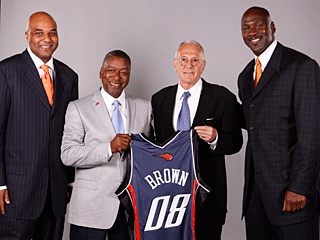

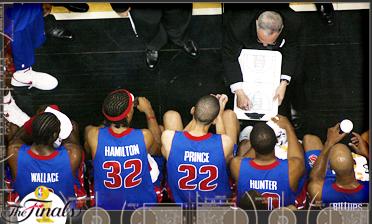

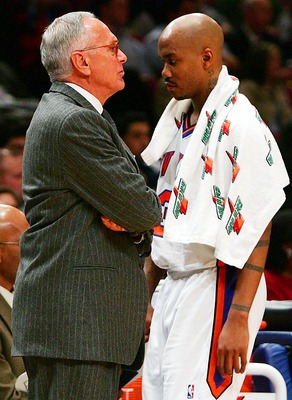






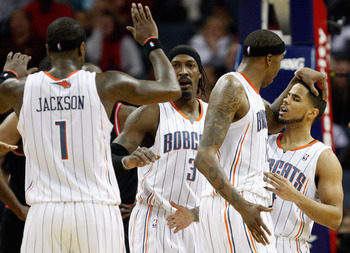
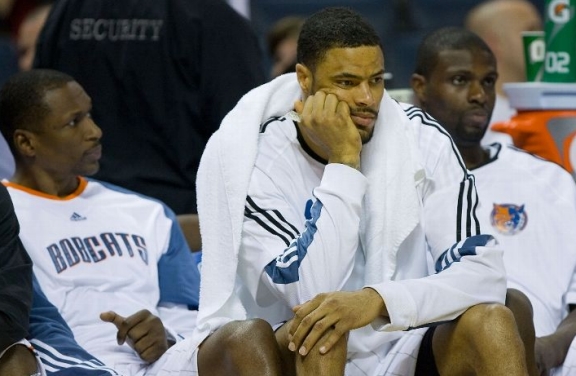





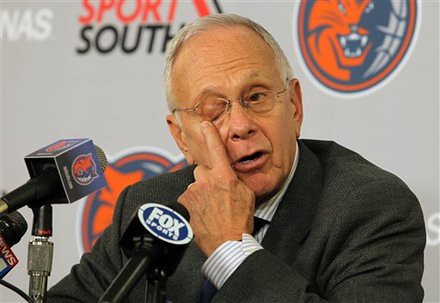
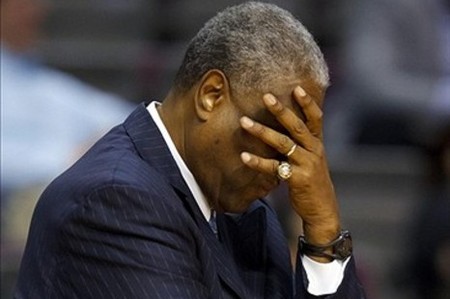

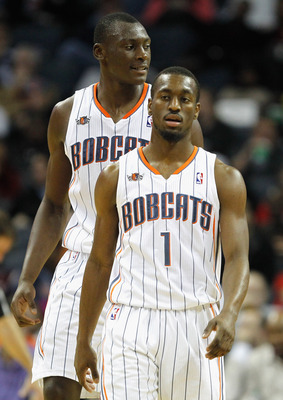
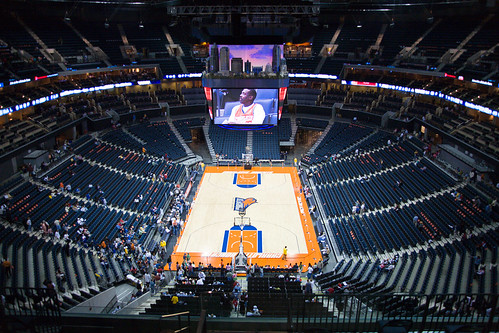
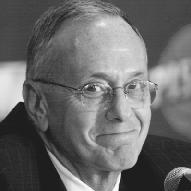

No comments:
Post a Comment